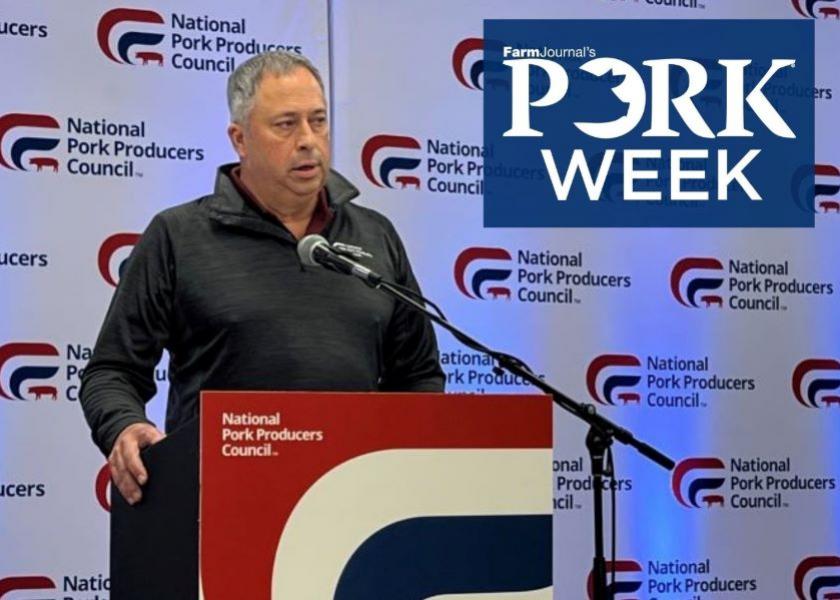NPPC Leaders Speak Out on Policy Priorities at World Pork Expo

Reasonable public policy that preserves producers' freedom to operate, ensures healthy animals, provides access to a reliable pipeline of workers and expands markets for pork products is essential to building a sustainable future, National Pork Producers Council (NPPC) president Terry Wolters said during a panel at the World Pork Expo on Wednesday.
The panel of NPPC experts discussed the pork industry’s current policy priorities that are vital to producers’ livelihoods and the future success of the industry. The Pork Industry Visioning Task Force prioritized international trade, foreign animal disease and labor as key policy issues to address that will move the industry forward.
“We need to lead on these issues, activating producers to tell their stories, collaborating with agricultural partners to amplify our voices, and working with policymakers and regulators to implement meaningful change," said Wolters, owner of Stoney Creek Farms in Pipestone, Minn.
1. Protect pig health from emerging threats.
As the threat of African swine fever (ASF) looms in the Western Hemisphere for the first time in four decades, efforts to protect U.S. borders have never been more critical.
“We are asking lawmakers for additional funding in key government programs to prevent and prepare for an outbreak,” said Liz Wagstrom, NPPC chief veterinarian. “Fully staffing our U.S. Customs and Border Protection agricultural inspection program and hiring additional APHIS-VS field staff are among the investments NPPC has requested.”
NPPC also supports passage of S.3678, the “Beagle Brigade Act of 2022,” which will fund the National Detector Dog Training Center.
2. Advocate for a reliable workforce.
The ongoing labor shortage continues to impact both producers and pork processors. NPPC supports visa reform that opens the H-2A visa program to year-round labor, without an annual cap on the number of visas, and provides a path to legal status for agricultural workers already in the country. NPPC also supports the inclusion of packing plant workers as agricultural labor.
“The lack of workers undermines a critical economic sector that in recent years has driven employment and wage growth faster than the overall economy,” Jack Detiveaux, NPPC manager of competition, labor and tax, said during the panel discussion. “Hog farming is vital to the prosperity of rural America and to maintaining an abundant supply of safe, nutritious pork for consumers here and around the globe.”
3. Strive for continued success of U.S. pork exports.
Negotiating new and expanding existing free trade agreements are critical to the industry’s growth. Joining the Comprehensive and Progressive Agreement for Trans-Pacific Partnership, or CPTPP, is a key priority to create American jobs and boost pork exports to an estimated 500 million consumers served in the 11-member pact, NPPC said.
“It’s vital for the U.S. pork industry to strengthen relationships in the Asia-Pacific region. CPTPP would put us on a level playing field with other pork trading countries, such as the EU,” Maria Zieba, NPPC assistant vice president of international affairs, said during the panel. “We are also encouraging the Biden administration to address market disparities as part of ongoing Indo-Pacific Economic Framework negotiations.”
NPPC said actions taken on these vital issues today will impact producers for years to come.
“We are committed to building momentum for groundbreaking advocacy work on behalf of pork producers,” NPPC CEO Bryan Humphreys said. “That means strengthening advocacy outreach by showing up in new ways; working more collaboratively across agriculture; and taking action in D.C., in states and in the global marketplace.”
We will be uniting together June 6-12 for PORK Week across all of our Farm Journal platforms to elevate the important role the pork industry plays in feeding the world. Share your stories and post photos on social media using #PORKWeek22 to help us honor the pork industry. From “AgDay TV” to “AgriTalk” to “U.S. Farm Report” to PorkBusiness.com and everything in between, tune in and join us as we acknowledge the most noble profession there is: feeding people.
Read More from Farm Journal's PORK:
Innovative Insight: How Bryan Humphreys Will Lead Pork Industry Forward
Economists Urge Pig Farmers to Watch Out for These Threats to Pork Outlook
Insomnia in Iowa: What Keeps a Pork Producer Up at Night?







